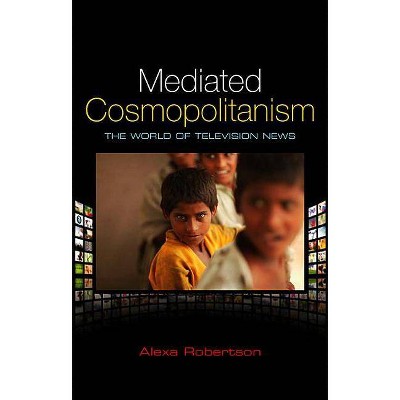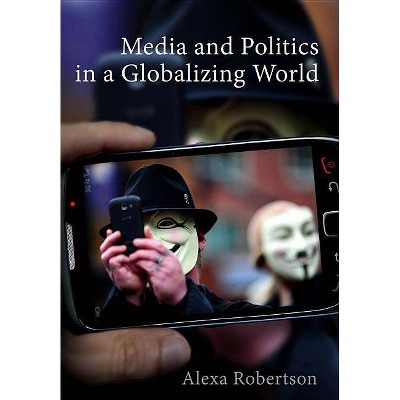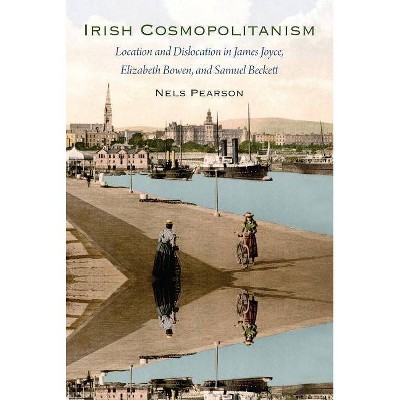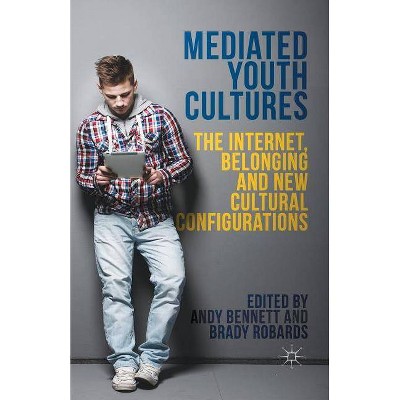Mediated Cosmopolitanism - by Alexa Robertson (Paperback)

Similar Products
Products of same category from the store
AllProduct info
<p/><br></br><p><b> About the Book </b></p></br></br>Based on the analysis of over 2000 news reports broadcast on national and global channels and interviews with journalists and audience members, 'Mediated Cosmopolitanism' illustrates that the same everyday stories about the world can take on different meanings in different cultures.<p/><br></br><p><b> Book Synopsis </b></p></br></br>Media power in the global era has to do with how people understand the world, their place in it, and their relation to the others who populate it. Making connections with distant places and people is the work of cosmopolitan imagination, which involves seeing the world through the eyes of others. In this book, Robertson engages with the growing literature on cosmopolitanism to address these issues, combining theoretical debates with an innovative empirical portal. Based on the analysis of over 2000 news reports broadcast on national and global channels and interviews with journalists and audience members, <i>Mediated Cosmopolitanism</i> illustrates that the same everyday stories about the world can take on different meanings in different cultures. It argues that if we are to understand how media actors may help people to make the connections that underpin a cosmopolitan outlook, attention must be paid to evidence that some actors may not, and that national broadcasters could be more active agents of cosmopolitanism than global channels. <p> Accessibly written, the book will be essential reading for advanced undergraduate and masters students, particularly of media studies, but also of sociology, politics and international relations.</p><p/><br></br><p><b> From the Back Cover </b></p></br></br>'Most media organizations are cutting budgets for overseas reporting. Yet globalization is making the world ever more interdependent. Robertson's book is a fascinating study of how viewers can recognize and identify with the distant Others who populate their television screens. It is essential reading for practitioners as well as scholars.'<br /> James Painter, Reuters Institute, University of Oxford<br /> <br /> <p>'We live in an increasingly interconnected and precarious global age. Today's media have an incredibly important part to play in recognizing how distant others are not so different from ourselves and in imagining how our world should be. Alexa Robertson's Mediated Cosmopolitanism lucidly and impressively explores the complexities and opportunities involved.'<br /> Simon Cottle, Cardiff University</p> <p>'Alexa Robertson offers a subtle and nuanced account of television news reporting and its audiences, showing how cosmopolitan sentiments are mediated through televisual storytelling and the popular imagination. A must-read book for all those interested in mass media, culture and politics in an epoch of globalization.'<br /> Robert Holton, Trinity College Dublin</p> <p>Media power in the global era has to do with how people understand the world, their place in it, and their relation to the others who populate it. Making connections with distant places and people is the work of cosmopolitan imagination, which involves seeing the world through the eyes of others. In this book, Robertson engages with the growing literature on cosmopolitanism to address these issues, combining theoretical debates with an innovative empirical portal. Based on the analysis of over 2000 news reports broadcast on national and global channels and interviews with journalists and audience members, <i>Mediated Cosmopolitanism</i> illustrates that the same everyday stories about the world can take on different meanings in different cultures. It argues that if we are to understand how media actors may help people to make the connections that underpin a cosmopolitan outlook, attention must be paid to evidence that some actors may not, and that national broadcasters could be more active agents of cosmopolitanism than global channels.</p> <p>Accessibly written, the book will be essential reading for advanced undergraduate and masters students, particularly of media studies, but also of sociology, politics and international relations.</p><p/><br></br><p><b> Review Quotes </b></p></br></br><br>Robertson has written a lucid and insightful text on media and cosmopolitanism. There is of course no one cosmopolitanism, yet in general terms a cosmopolitan imagination involves us in seeing the world through the eyes and ears of other people. The book is an important contribution to the task of trying to make exactly that kind of cross-national connection.<br /><b>European Journal of Communication</b> <p> We live in an increasingly interconnected and precarious global age. Today's media have an incredibly important part to play in recognizing how distant others are not so different from ourselves and in imagining how our world should be. Alexa Robertson's <i>Mediated Cosmopolitanism</i> lucidly and impressivley explores the complexities and opportunities involved.<br /><b>Simon Cottle, <i>Cardiff University</i></b></p> <p> Most media organisations are cutting budgets for overseas reporting. Yet globalisation is making the world ever more inter-dependent. Robertson's book is a fascinating study of how viewers can 'recognise and identify with the distant Others who populate their television screens'. It is essential reading for practitioners as well as scholars.<br /><b>James Painter, <i>University of Oxford</i></b><br /> <br />This is a most welcome contribution to the analysis of the place of media discourses within the unfolding process of cultural globalization, and to the literature on cosmopolitanism more generally. This book is a model of organization, which maintains both its focus and its impetus throughout, and which continuously engages the reader with vivid exemplifications of complex moral-cultural debates.<br /><b>John Tomlinson, <i>Nottingham Trent University</i></b></p> <p> Alexa Robertson offers a subtle and nuanced account of television news reporting and its audiences, showing how cosmopolitan sentiments are mediated through televisual storytelling and the popular imagination. A must-read book for all those interested in mass media, culture and politics in an epoch of globalization.<br /><b>Robert Holton, <i>Trinity College Dublin</i></b></p><br><p/><br></br><p><b> About the Author </b></p></br></br>Alexa Robertson is a Senior Lecturer in the Department of Political Science at Stockholm University
Price History
Price Archive shows prices from various stores, lets you see history and find the cheapest. There is no actual sale on the website. For all support, inquiry and suggestion messagescommunication@pricearchive.us




















